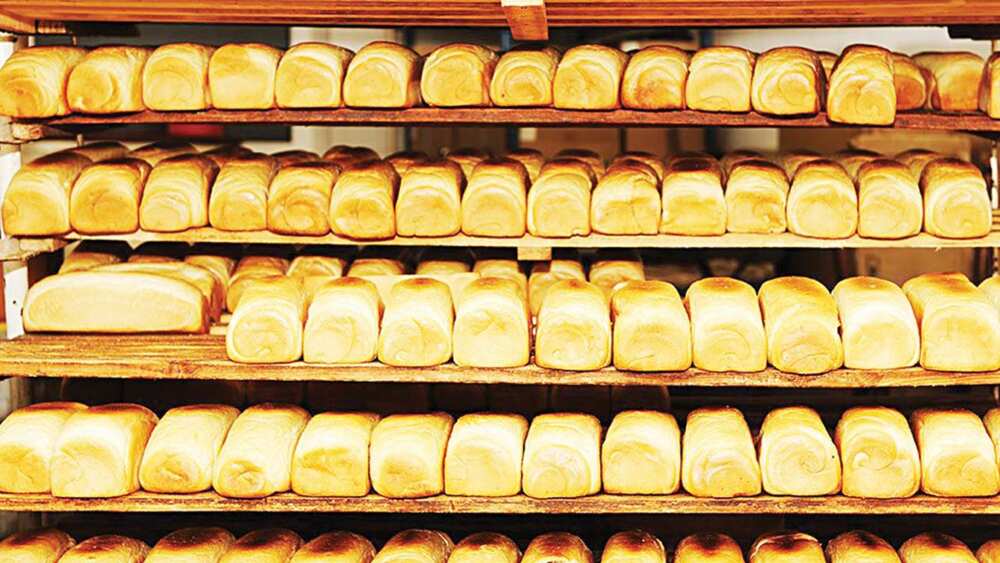Cost of living: Nigerians to pay more as bakers hike bread price by 20 percent
- The price of bread as once again been review upward by bakers, under the aegis of the Premium Breadmakers Association of Nigeria (PBAN)
- This time around, the bakers hiked the price of the common commodity by 20 percent amid surging production costs
- The association said though the use of cassava and potato flour was an option, but the challenge was that the specific species of cassava was not sufficient in Nigeria
PAY ATTENTION: Click “See First” under the “Following” tab to see Legit.ng News on your Facebook News Feed!
Nigerian bakers have decided to hike the price of bread by 20 percent amid surging production costs.
Last week, bakers, under the aegis of the Premium Breadmakers Association of Nigeria (PBAN), embarked on a four-day warning strike to demand government intervention regarding the prices of materials used in bread production.

Source: UGC
On Monday, Bakers in Cross Rivers said they would increase prices and reduce production quantities amid the high cost of ingredients.
Thomas Odey, leader of the Master Bakers group, said in an interview with NAN.
PAY ATTENTION: Subscribe to Digital Talk newsletter to receive must-know business stories and succeed BIG!
Odey said the Cross River master bakers did not join the national body in their two weeks withdrawal of service.
“The planned increment is not even enough, this is because the price of every means of production has increased from condiments to diesel and all other raw materials,” Odey said.
“This is a global issue that is not peculiar to Nigeria or materials for baking alone, but the price of every foodstuff has increased significantly.
“In my contacts with big flour mills in the country, they will tell you the Russia/Ukraine crisis, exchange rate and the issue of sourcing foreign currency are posing major challenges and increasing the price of wheat flour.”
Odey further said the use of cassava and potato flour was an option, but the challenge was that the specific species of cassava needed for good flour production was not sufficient in Nigeria.
He added that the normal cassava that was common in Nigeria was bitter when used to produce flour, while potato cultivation was still largely at a subsistence level, making production insufficient in the country.
“In my training with Flour Mill, I discovered that they mixed cassava flour with wheat to get what they used, but the kind of cassava they used was a species we need to develop in large quantities,” he added.
In a separate interview, Gabriel Bamidele-Adeniyi, chairman, Association of Master Bakers and Caterers of Nigeria, Kogi, told NAN on Sunday that bakers would resume production after weeks of the strike.
He, however, said there would be an increase in the prices of their products.
“Although the federal government is yet to respond to our pleas and demands, we are satisfied that we have at least sent a message hoping for a positive result,” he said.
“Unfortunately, as we resume production July 25, prices of bread will increase by 20 percent.
“A bread of N200 will cost between N240 and N250, that of N500 will cost N600, that of N600; N750, that of N700 will cost N880 and that of N800; between N980 and N1,000, respectively.
“We want the public to know that the new increment in prices of stable bread is not our making but that of the increase in the prices of commodities we use in bread production.
“We want the government to see to it that prices of yeast, sugar and flour being imported are drastically reduced so that only three companies have the licence to import them.
“Unfortunately, those three firms are monopolising the prices of sugar, yeast and flour to the detriment of bakers in Nigeria.”
Bamidele-Adeniyi urged the government to ensure that the sugar company in Bashuta commenced production, adding that there should also be an opportunity for members to obtain the licence to import and obtain loans for better bread production.
Don't ban okada, millions of riders will be pushed into poverty, association claims
Meanwhile, the plan by the federal government to enforce a nationwide ban on commercial motorcycles popularly known as Okada could render millions of riders jobless and poor.
The President, the National Commercial Motorcycle and Tricycle Owners and Riders Association of Nigeria, Usman Gwoza, said this on NTA’s Good Morning Nigeria programme which was monitored by our correspondent on Monday. Gwoza argued that the high unemployment rate in the country was what made many go into the business.
He added that members of the National Assembly channelled a large portion of their constituency projects to empower their constituents with motorcycles. Gwoza maintained that if gifting constituents with motorcycles amounted to empowerment, seizing these same motorcycles would be a form of disempowerment.
Source: Legit.ng





